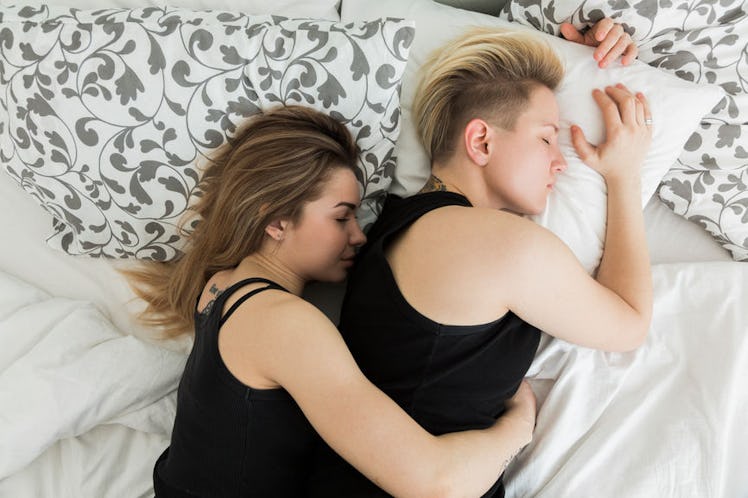
Science Says Having This 1 Experience In Your 20s Can Affect How You Sleep In Your 30s
Not to freak you out or anything, but the choices you make today really do have an impact on your future, even in ways you wouldn’t expect. Life is funny that way; sometimes two completely different aspects of life can collide like colors in a messy drawing, and you’re stuck trying to figure out the bigger picture. Take your love life, for example. Did you know your romantic relationships can affect your sleep? I’m not necessarily referring to that can’t-eat, can’t-sleep phase where everything’s coming up roses and you and your partner can’t get enough of each other, either. According to new research, negative relationship experiences in early adulthood might have some unexpected effects on your sleep quality well into your 30s.
According to the American Sleep Apnea Association, 50 million Americans suffer from chronic sleep disorders, while an additional 20 to 30 million report the occasional night of tossing and turning. If you’re among that 20 to 30 million, but haven’t been able to identify the issue just yet, the results of a new study, published in Personal Relationships, a journal of the International Association For Relationship Research, suggest that negative romantic relationship experiences can impact your sleep quality over the long-term. I know, like the negative relationship itself wasn't bad enough, right?
The study documented the possible correlation between participants' romantic relationships, stress, and how both of these elements affect sleep quality over the course of adulthood. Researchers recruited 112 participants from the Minnesota Longitudinal Study of Risk and Adaptation and studied them from the age of 23 years old to 32 years old. In the end, per a ScienceDaily press release, the researchers found that people who reported having positive relationship experiences in their early 20s were less stressed and enjoying quality sleep in their early 30s. "Although a large body of evidence shows that relationships are important for health, we are just beginning to understand how the characteristics of people's close relationships affect health behaviors, such as sleep," Chloe Huelsnitz, a PhD candidate at the University of Minnesota and lead author of the study, said in a statement, per the ScienceDaily press release.
Generally speaking, says Dr. Tammy Nelson, a sex and relationship expert and licensed psychotherapist, one of the most common emotions that can affect your sleep patterns is anxiety, and as I'm sure you know from experience, no matter how good or bad your relationship is, it can sometimes give you a little bit of stress.
“Being anxious can keep us up at night, prevent sleep, and wake us up once we are asleep,” because it raises blood pressure, increases heart rate, quickens your pulse, and tenses up your muscles, Nelson tells Elite Daily over email. “These are all reactions that are in direct opposition to the relaxation that needs to happen when we are asleep.”
But even after you and a partner eventually decide to part ways, if you’re still dealing with pent-up feelings of stress from the relationship, Natalie Dautovich, an environmental scholar for the National Sleep Foundation, says you can still be affected. “We are physically most vulnerable when we are sleeping, so sleep is most possible when we feel safe and secure,” Dautovich tells Elite Daily.
If you’re reading all of this and thinking “well, that’s pretty unfair,” you aren’t wrong. But the thing is, you still have control over your sleep health, and there are ways to ensure that, no matter what happens in terms of your love life, you're still doing everything you can to get your rest.
Of course, if you are currently in a relationship, that doesn't just automatically mean your sleep health, in the short- or long-term, is doomed. In fact, a physical connection with a loved one, such as a hug, kiss, or even sex, can calm your nervous system, therefore decreasing stress and anxiety, making it easier to fall and stay asleep, Nelson explains. However, at the same time, it's important to remember that having your own bedtime routine of some kind, made up of rituals (taking a warm bath, meditating, journaling, diffusing essential oils, etc.) that soothe you without the help of a partner, she adds, is just as key.
Having an SO around can also benefit your sleep health in some slightly more unexpected ways. For instance, they can be there to help hold you accountable when you’re trying to cut back on using your phone in bed, or stick to an earlier bedtime. “A benefit of having a sleeping partner is that they often are the first to notice sleep difficulties (e.g., snoring related to sleep apnea),” Dautovich says, so the two of you can both provide support and promote healthy sleep behaviors for one another. It's certainly worth the try, right? Clearly the sleep of your future self depends on it.